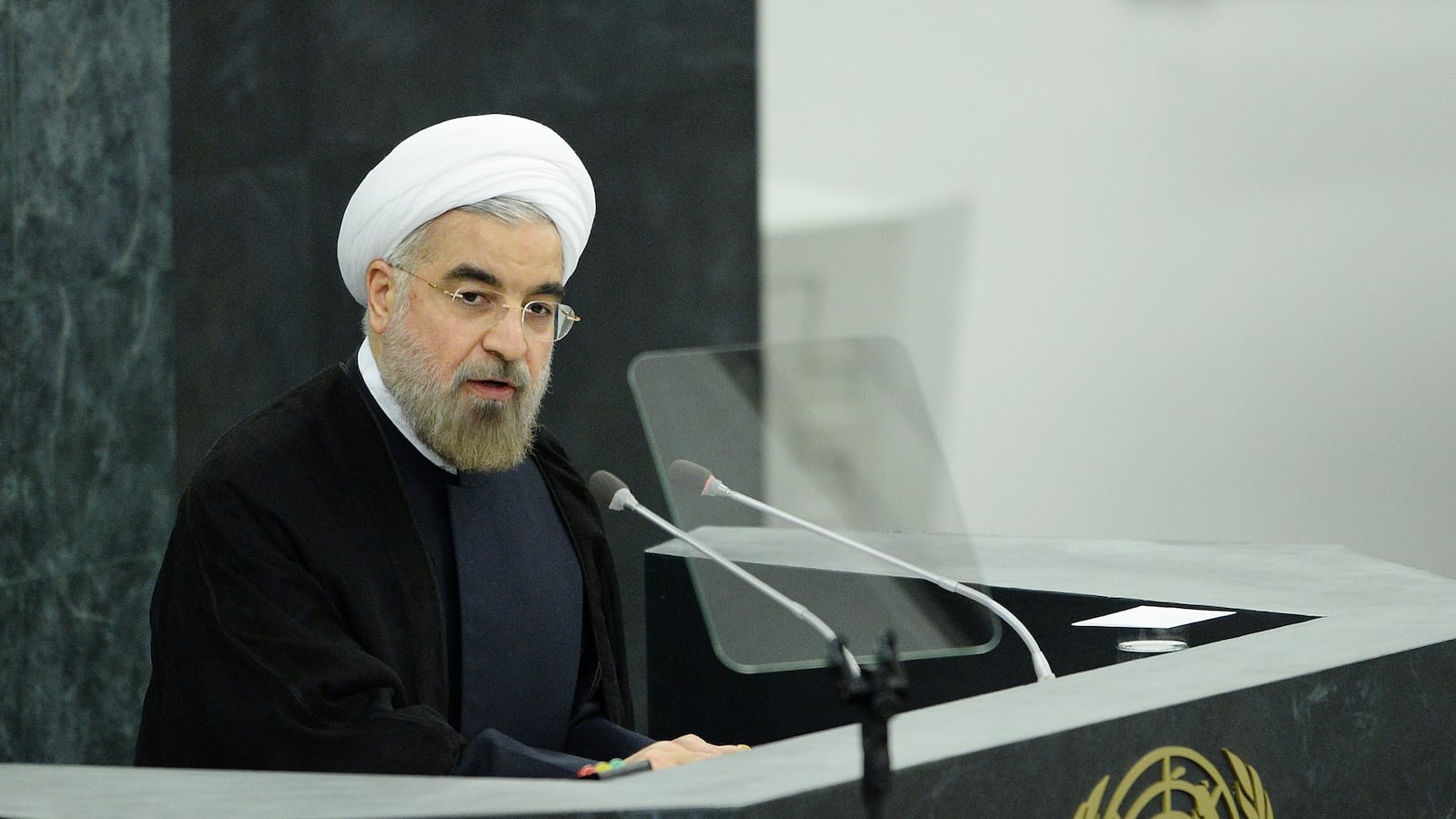Only at the breakneck pace of Iran's recent conciliatory statements and—yes—actions could the absence of a handshake between Barack Obama and Hassan Rouhani be viewed as a breakdown in advancing diplomacy. Likewise with Rouhani's monotonous U.N. General Assembly speech dwelling on painting a snooze-worthy anti-imperialist picture of the world. But checking out the commentary, one might get the wrong impression. "It seems as if the Rouhani-as-moderate-savior meme has lost some of its oomph in the wake of his speech, and his refusal to meet Obama," wrote the sometimes hawkish journalist Jeffrey Goldberg on Twitter, encapsulating much of the skepticism after Rouhani failed to show up at a lunch hosted by U.N. Secretary-General Ban Ki-Moon, and attended by Obama.

Make no mistake: for those of us who think diplomatic engagement between Iran and the U.S. cannot come fast enough, the failure was a disappointment, as was Rouhani's speech. But neither means engagement is either infeasible or on the skids. Both the non-handshake and his speech might be seen as Rouhani tapping the brakes, not slamming them. A White House official said that carrying out the meeting was "too complicated for the Iranians to do at this point." For his part, Rouhani ascribed his failure to attend the luncheon to a lack of preparation. "The United States declared its interest in having such a meeting. And in principle, Iran could have, under certain circumstances, allowed it to happen," Rouhani told CNN last night. "But I believe we didn't have sufficient time to really coordinate the meeting."
Despite the disappointment, the thaw between Iran and the U.S. continued apace. Rouhani did say in his address, "Our national interests make it imperative that we remove any and all reasonable concerns about Iran's peaceful nuclear program"—though that message was not new and was accompanied by no specifics. Then, during his CNN interview, Rouhani addressed an issue that's badly damaged Iran's international image over the past eight years, expressing that the Holocaust was a crime committed by Nazis against Jewish people. The remark was perhaps muddled by Rouhani's statement that he's a politician, not a historian, but it was what it was. The Israeli-Iranian analyst Meir Javedanfar wrote that he'd like for Rouhani to be more forthright, but also put the remark in the context of Iran's domestic politics, certainly a limiting factor for the Iranian president, just as it is for the American one. It's easy, amid the disappointment in Rouhani's appearance in New York, to forget just how bad his predecessors’ trips here have been. Rouhani may not have made a big splash, but at least he didn't make one for the wrong reasons.
On the other hand, Obama's speech was more or less exactly the kind of concessions, in terms of rhetoric, that Rouhani said he wanted. Obama shied away from overt hawkishness. "Since I took office, I’ve made it clear in letters to the Supreme Leader in Iran and more recently to President Rouhani that America prefers to resolve our concerns over Iran’s nuclear program peacefully," he said from the podium, "although we are determined to prevent Iran from developing a nuclear weapon." That's as hawkish as it got. Obama swore off regime change as a U.S. policy; noted the Iranian Supreme Leader's fatwa against nuclear weapons; spoke of Iranian disdain for American "interference" in their affairs; and, in a section on chemical weapons in Syria, singled out Iran as victims of Saddam Hussein's chemical attacks in the 1980s. What was most notable, though, was what Obama didn't say: there were no threats to use force, whether directly or through the oft-deployed euphemism of keeping "all options on the table."
The much-ballyhooed handshake would have been perhaps symbolically the grander gesture, but far more important will be Thursday's meeting of Iran and the P5+1 group (China, Russia, Germany, the U.K., France and the U.S.). At that sit-down, Iran's foreign minister Mohammad Javad Zarif will come face to face with his counterpart, John Kerry. The table between them will bear the weight of history: it will host the highest-level meeting between American and Iranian officials since 1979's Islamic Revolution. For perspective, one might think back to six months ago: a handshake between foreign ministers, let alone presidents, was then unthinkable. Let's wait to see if both top diplomats make it to that table before declaring diplomacy a fruitless exercise.
Obama's tone and rhetoric should be seen as welcome signs in Tehran, and Thursday's meeting will be the first glimpse into whether they can pave the way for what Khamenei has called "heroic flexibility." Matt Duss hit on these points in his excellent weekly foreign affairs column in the Prospect: "A key divide right now is between those who recognize that Iran has politics, and those who don’t," he wrote. Those in the U.S. who oppose dealing with Iran fail to recognize that they're just as incensed at Obama's outreach as Iran's own hard-liners are at Rouhani. And in Tehran, they should recognize that there will be hiccups in Washington as well: our own hard-liners are busy laying down conditions for a deal that, if implemented, are sure to diminish the possibility of one. A deal isn't a shoe-in: there are moving parts on both sides that will need to be either marginalized or accommodated along the way. Obama himself probably put it best from the podium of the General Assembly Hall yesterday: "The roadblocks may prove to be too great. But I firmly believe the diplomatic path must be tested."






